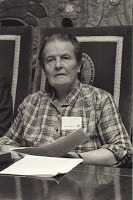
In the January 1958 issue of Philosophy, British philosopher G. E. M. (Gertrude Elizabeth Margaret—“Elizabeth”) Anscombe (1919-2001) published one of the most important philosophical articles of the twentieth century, “Modern Moral Philosophy.” (You may recognize Anscombe as the young philosopher who, ten years earlier, bested C. S. Lewis in a debate at the Oxford Socratic Club).
Other than Edmund Gettier’s 1963 piece in Analysis, “Is Justified True Belief Knowledge,” arguably no single philosophy article has generated so much discussion and lasting influence. One legacy of “Modern Moral Philosophy” is Anscombe’s introduction of the term consequentialism, which has since become the standard way to describe ethical views like utilitarianism, according to which the moral value of an action is a function solely of the consequences produced by it. (Brute facts is another common philosophical term Anscombe introduced here).
But by far the most significant effect of “Modern Moral Philosophy” was its defining role in the birth of contemporary virtue ethics, as an alternative to the dominant Kantian and utilitarian approaches. (Alasdair MacIntyre’s After Virtue, in 1981, was the second key moment).
Of course, there’s actually nothing new about this movement. It’s a recovery—a return to the classical philosophical and theological tradition, especially (for Anscombe herself) to Aristotle. But in 1958 (and in the 1980’s, when I first studied moral philosophy), focusing on virtues and character was new and exciting—a revolution.
It still is exciting and revolutionary, at least to me. But now, like other revolutions of that era, this one has reached senior status.
Is virtue ethics now old hat?
Has virtue ethics become old and creaky? Irrelevant? Its energy spent or dwindling?
Hardly. It’s gone mainstream.
Moral philosophers and theologians are actively producing fruitful analyses of a whole range of virtues (and vices), and continue to do exciting work in moral psychology and action theory, neglected areas identified by Anscombe as needing philosophical attention. But taking virtue seriously has moved far beyond philosophy. It’s now mainstream in the field of psychology (see, for example, Peterson and Seligman’s massive Character Strengths and Virtues: A Handbook and Classification) and education. In addition, talk of “human flourishing”—another of Anscombe’s distinctive emphases—now pervades all the disciplines.
To some extent, these effects of “Modern Moral Philosophy” carry a bit of irony. As with her chief philosophical influence, Ludwig Wittgenstein (who called her “old man”), Anscombe’s writing was terse and, dare I say (with appropriately British understatement), “not always as clear as we might wish.” This is evident in the very different interpretations made of her arguments in the article, particularly concerning the notion of moral obligation.
According to Anscombe,
"The concepts of obligation, and duty—moral obligation and moral duty, that is to say—and of what is morally right and wrong, and of the moral sense of “ought,” ought to be jettisoned if this is psychologically possible; because they are survivals, or derivatives from survivals, from an earlier conception of ethics which no longer generally survives, and are only harmful without it."
And what is this earlier conception? “The answer is in history: between Aristotle and us came Christianity, with its law conception of ethics.”
Anscombe says,
"To have a law conception of ethics is to hold that what is needed for conformity with the virtues . . . is required by divine law. Naturally it is not possible to have such a conception unless you believe in God as a lawgiver; like Jews, Stoics, and Christians. But if such a conception is dominant for many centuries, and then is given up, it is a natural result that the concepts of “obligation,” of being bound or required as by a law, should remain though they had lost their root."
According to Anscombe, the “modern” ethical theories of both Kantianism and utilitarianism, with their talk of “moral obligation,” unwittingly presuppose what is only valid within the framework of divine law. But since “we” no longer believe in a divine lawgiver, she seems to be saying, we should give up on such language. Instead, we should simply focus, as did Aristotle, on virtues.
This is exactly what modern virtue ethicists, following Anscombe, have done.
The irony, however, is that Elizabeth Anscombe herself was a devout Christian, a strong believer in divine law and its expression in the natural law tradition. Indeed, she defended it in print and practiced it in her own life—from outspoken and controversial opposition to the bombing of Hiroshima, prior to writing “Modern Moral Philosophy,” to arrests and imprisonment for non-violent prolife activism as an elderly woman.
So in 1958, was Anscombe arguing, as commonly interpreted, that virtue ethics replace all moral thought based on moral obligation? Or was she employing a kind of modus tollens argument, indirectly commending the importance of acknowledging a divine basis of obligation? (See Julia Driver’s article on "Anscombe" in the Stanford Encyclopedia of Philosophy.)
This post was originally published with The Evangelical Philosophical Society.
 Biola University
Biola University


.jpg)
